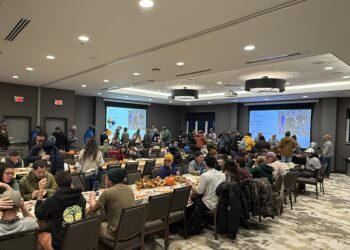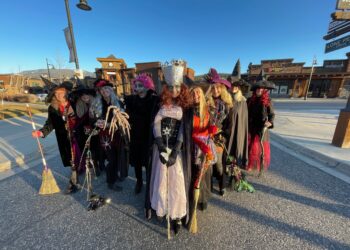July 29, 1943 – Feb. 10, 2025

Given the number of words John Gladstein wrote, spoke, and thought during his 81 and a half years of life—and given his simultaneously lovable and, at times, eye-roll–inducing tendency to ponder himself—it’s rather a surprise that he didn’t write his own obituary.
But perhaps that would have been a bit too on the nose—and despite the size and scope of John Gladstein’s wonderfully Ashkenazi nose, he prided himself on self-awareness and a degree of humility (of which he was unafraid to inform you) that might have kept him from romanticizing himself in post-mortem tribute.
And so it is for us the living to take on the considerable task of summing up a life lived in many phases, across and among moments of great significance in American history.
Born to parents he idolized—Richard Gladstein, attorney and defender of persecuted communists during the Red Scare, and Caroline (Dwofsky) Decker, labor organizer and firecracker whose name would be written in history books alongside César Chávez—John grew up with an idea of himself as someone separate and apart from the rest. His parents reaffirmed this, and indeed he had a way with words, a knack for sports, a fighter’s spirit, and a hunger and curiosity for knowledge and experience that differentiated him early.
Most of all, he was funny, born with a performer’s flair. An early love of Mel Brooks and Carl Reiner’s 2,000 Year Old Man led from living-room performances in the early ’60s all the way to raucous family car rides in the 2000s; his love of fundamentally Jewish humor never waned; and his quick wit, twinkling eyes, and an unabashed desire to make anyone laugh, in any situation, made him memorable to waiters, car rental agents, real estate brokers, and most of those who encountered him.
A high school athlete who cared more for sports than he did for his studies (though we’d rarely hear much about this preference later on!), he grew more serious as a scholar at UC Berkeley, where he was early to join the anti-war and free-speech movements on campus, marching with Mario Savio, occupying university buildings, and generally showing himself to be the righteous, idealistic, anti-authority son cut from the same cloth as his two parents.
After college, he attended law school at the Golden Gate University School of Law, both leery of and attracted to the idea of following in his formidable father’s footsteps. He quickly found himself a lawyer for the disenfranchised in San Francisco, famously representing a group of Vietnam Veterans who’d occupied a government building downtown. “The war is on trial,” he said in the newspapers.
After winning the trial but losing his faith in the system, he fled the buttoned-up world of law for the barefoot rhythm of Mill Valley. There, he ran Ali Baba’s—a vegetarian café with a clientele that included David Crosby and James Taylor. On the side, he conducted “international trade” (i.e. ran marijuana) from Mexico to California, which at one point brought him within shouting distance of the Mexican navy on a sailboat.
In 1973, as a full repudiation of his parents’ cosmopolitan city life, he bought an 80-acre mountaintop in Napa Valley where he’d been a camper and counselor in the ’50s. There, with little more than a camper and a pair of brush cutters, he built Rainbow Ranch: part hippie haven, part spiritual retreat, part money sink, part logistical miracle, and awe-inducing to all who visited. Even as he hosted guests like Wavy Gravy, Patch Adams, Marion Rosen, and Rolling Thunder, he found his way back into the law—representing unions across Northern California until becoming City Attorney of Calistoga in 1981. He held that role for eight years and later served as a circuit court judge in Sonoma County. Throughout, Rainbow Ranch held a special place in the hearts of thousands of people from around the world who experienced the magic of the mountaintop he cultivated.
Over time, family and community took center stage. He loved nothing more than coaching his kids in soccer and Little League—a role he embraced with gusto, to the great surprise of no one. As a coach, and a father, he held the whistle, the wisdom, and the final word.
After selling Rainbow Ranch in 2001 to a dotcom entrepreneur with big dreams and even bigger pockets, he stayed close to the land—living nearby with his family and throwing himself into the civic and cultural life of Santa Rosa, even as he continued to cut horse trails from his new home. He joined the Santa Rosa Symphony Board, the Arts Council, and helped lead the charge to build a permanent home for the Jewish community at Congregation Shomrei Torah.
Later, in Montana, he found new terrain to steward. He helped steer Moonlight Basin through the chaos of the 2008 financial crisis and served as president of the Big Sky Owners Association—proof that not even elk or mountain air could keep him from his calling to run meetings and debate bylaws. And with Andi, the love of his life, he designed and built the home of their shared dreams at the foot of Lone Mountain.
John inherited much from his parents, but nothing more defining than his drive to understand the world—and himself. He was compelled to ask how life should be lived, and eager to share his answers. But in an absolutely essential way, he differentiated himself from them: out of the ache of a rootless childhood came a deep longing to build what he hadn’t had—a family, a system, a center of gravity (not to mention many elaborate family vacations). The tools didn’t always come easily, but the love was unmistakable—felt, fierce, and wholly his own.
John loved to advise, to negotiate, to solve complex problems, to build, and to create. He adored his three grandchildren, Max, Jude, and Vivi, and was never happier than the day he became ‘Boppa.’ He passed on a love of heartbreaking love songs and blue-eyed soul, of snowcapped mountains and ski lifts, of exploration and nonconformism. He passed on his Jewishness—his enduring desire to find his place in the world, and the struggles that came with it—and a fair few neuroses, too. Most of all, he passed on his love of family to us, his children and grandchildren, and his hunger for closeness to all who knew him well. May we reach for each other more often, and find each other more easily, because of him. And may his memory forever be a blessing.












